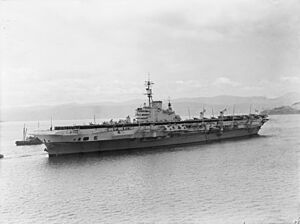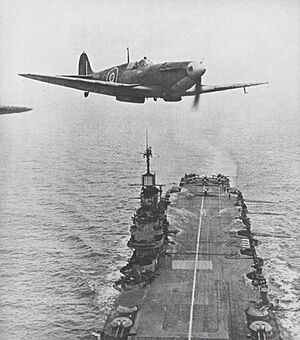Fred Hockley facts for kids
Quick facts for kids
Fred Hockley
|
|
|---|---|
| Born | 1923 Littleport, Ely, Cambridgeshire |
| Died | 15 August 1945 (aged 22) Ichinomiya, Chiba, Japan |
| Allegiance | |
| Service/ |
Fleet Air Arm |
| Rank | Sub-Lieutenant |
| Battles/wars | Second World War |
Frederick (Fred) Hockley (1923–1945) was a brave English pilot in the Royal Navy during World War Two. He flew fighter planes for the Fleet Air Arm, which is the Royal Navy's air force. Fred was part of the very last combat mission flown by British planes in the war.
Sadly, just hours after Emperor Hirohito announced that Japan would surrender, Fred Hockley was killed by soldiers. This happened on August 15, 1945. Later, two officers who ordered his death were found guilty of war crimes. They were punished in Hong Kong in 1947.
Early Life and School
Fred Hockley was born in a small town called Littleport. This town is near Ely in Cambridgeshire, England. His father worked for the local water board. He was also a bellringer at the church.
Fred went to Soham Grammar School. He was known for being a very good swimmer.
His Last Mission Over Japan
Fred became an officer in the Royal Naval Volunteer Reserve. He was sent to the aircraft carrier HMS Indefatigable. There, he became a pilot for a Supermarine Seafire fighter plane. He was part of 24 Wing of the Fleet Air Arm.
On August 15, 1945, Fred took off from the ship. He was leading five other Seafire planes. Their job was to protect other planes. These planes were Fairey Firefly and Grumman Avenger fighter bombers. They were going to attack airfields near Tokyo Bay in Japan.
However, the planes changed their target. They went to a chemicals factory in Odaki Bay instead. During the mission, Fred's radio stopped working. His plane was attacked by Japanese Zero fighters. Fred had to bail out of his aircraft. He parachuted safely to the ground near a village called Higashimura. The other planes, now led by another pilot named Victor Lowden, completed their mission.
Captured and Killed
After landing, Fred Hockley surrendered to a local air raid warden. The warden took him to the local civil defense office. From there, Fred was handed over to the 426th Infantry Regiment. This army unit was stationed in Ichinomiya.
At the army headquarters, the commanding officer was Colonel Tamura Tei'ichi. He had just heard Emperor Hirohito announce Japan's surrender on the radio. Colonel Tamura called his division headquarters for advice. He wanted to know what to do with Fred, the captured pilot.
Major Hirano Nobou, an intelligence officer, told him to "finish him off" in the mountains that night. Colonel Tamura later said he was shocked by this order. He felt it was "unkind." But he also felt he had to obey an order from his commanders.
So, Colonel Tamura told his assistant, Captain Fujino Masazo, that Fred had to be killed. He also said that Captain Fujino should do it where no one could see. Captain Fujino then ordered Sergeant Major Hitomi Tadao to move Fred to the regimental headquarters. There, Hitomi was told to take six soldiers into the mountains. They were told to dig a grave.
Around nine o'clock that night, just hours after the Emperor announced the end of the war, Fred Hockley was sadly killed.
Finding the Truth
The truth about what happened to Fred Hockley came out later. This was when Allied forces began to investigate. Captain Fujino told them the whole story.
Colonel Tamura, Major Hirano, and Captain Fujino were taken into British custody. They were put on trial in Hong Kong for war crimes. This trial happened between May 30 and June 13, 1947.
Colonel Tamura and Captain Fujino said they were just following orders. Major Hirano said he only ordered that Fred be dealt with according to army rules. He claimed he did not expect Fred to be killed.
After hearing all the different stories, Colonel Tamura and Major Hirano were found guilty. They were sentenced to death and executed on September 16, 1947. Captain Fujino was sentenced to 15 years in prison.
The military prosecutor at the trial was Major Murray Ormsby. He was deeply affected by the case. He worried that Fred Hockley's sacrifice would be forgotten. In 1995, he started placing a special memorial notice. He put it in the Daily Telegraph newspaper every year on August 15. This was the anniversary of Fred Hockley's death.
 | Sharif Bey |
 | Hale Woodruff |
 | Richmond Barthé |
 | Purvis Young |



